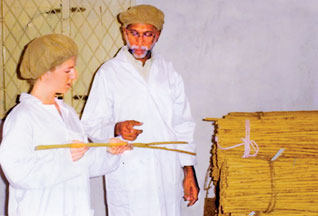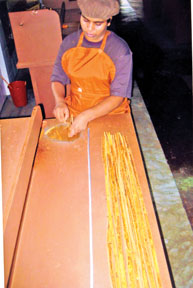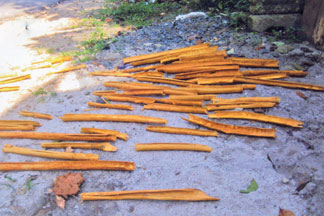Cinnamon factory provides training for product upgrade
by W.T.J.S. Kaviratne - Ambalangoda Special Corr.
In 2007, the German Technical Corporation (GTZ) established a program
for the promotion of micro, small and medium enterprises (PMSME) in Sri
Lanka.
 |
|
Christine Stephen, a student from
Johannes Gutenberg University, Frankfurt, Germany with
Managing Director Jayatillake who enlightened her on the
intricacies of cinnamon production. |
Under this program the cinnamon industry was identified to be
upgraded to reach the standards of the international market.
In 2000, the Managing Director of Dasanayake Walauwa Plantation,
A.D.W.K. de Zoysa Jayatillake took the initiative to start a modern
cinnamon processing factory at Kosgoda.
This factory was recognised by the EDB and GTZ as a model cinnamon
processing factory in Sri Lanka processing cinnamon that confirms to
international standards.
The factory was the first to obtain GMP HACCP certification for the
cinnamon industry in the country. This certification is a requirement to
prove quality standards of cinnamon product for the international
market.
Jayatillake de Zoysa said his vision is to uplift the social
conditions of cinnamon peelers and to give recognition to their
livelihood while improving the cinnamon industry in the country.
He realised his dream by constructing a state-of-the-art cinnamon
factory - the first of its kind in Sri Lanka.
The dirty gunny kept on the floor where the peeler usually sat during
peeling was replaced by a scraping bench.
Instead of dusty floors, quill making tables were introduced, drying
racks and tree holding rests were other innovations introduced by de
Zoysa in facilitating cinnamon processing. Uniforms, gloves and caps
were provided to employees.
GTZ consulted de Zoysa in launching the PMSME program related to the
cinnamon industry as he is the pioneer in the modern method of cinnamon
processing in Sri Lanka.
On a request made by eight cinnamon processing companies planters,
factory owners, staff including peelers were given a full-fledged
training on every aspect of modern cinnamon processing methods free of
charge, under the guidance of de Zoysa at the Dasanayaka Walauwa
Cinnamon Plantation Factory. Soon after the International HACCP Standard
Certificate was awarded to these factories.
 |
|
Cinnamon Quill Making is done on a
specially designed table at the Cinnamon Processing Factory
of Dasanayake Walauwa Plantation, Kosgoda. |
In 2009 all the nine Cinnamon factories having ISO 22000 and HACCP
certification joined together and formed a company known as U 10 -
Certified Ceylon Cinnamon (CCC) in 2009, the EDB provided financial
assistance to 16 other cinnamon processing factories to upgrade their
factories to qualify for the Certificate of Good Manufacturing Practices
(GMP) and ISO 22000, and in 2010, EDB has identified another 20
factories for upgrade.
Christine Stephen a student from Johannes Guntenberg University,
Frankfurt, Germany came to Sri Lanka to do research on the cinnamon
industry. She visited Dasanayaka Walauwa Plantation Cinnamon Processing
Factory to gather information for her thesis 'Ceylon Cinnamon -
International Trade Relations and Market Potential'.
During her stay in Sri Lanka she visited all eight ISO 22000
certified cinnamon processing factories in addition she visited the
cinnamon plantations and observed how the rural folk engaged in cinnamon
processing in the traditional manner.
Speaking on her findings, Chistine said that she had the opportunity
to see how some cinnamon producers were engaged in sulphuring.
A poisonous chemical such as sulphur should not be used in cinnamon
processing, she said. Cinnamon dealers were in the habit of applying
sulphur fumigation for discoloured cinnamon to obtain natural colour and
in the process harmed the industry' she said.
The taste of natural cinnamon was affected by sulphuring and
sulphured cinnamon could be easily identified by taste and colour, she
said. According to Chirstine in 2005 - 2006 a stock of cinnamon sent to
Germany from Sri Lanka was banned and sent back on suspicion of
sulphuring.
If the guidelines of Good manufacturing Practices (GMP) were followed
no sulphuring was required in processing cinnamon, she said.
She said that there was great potential in Germany for cinnamon and
Sri Lankan authorities should take steps on a promotional drive. German
buyers did not know the difference between cassia and cinnamon.
De Zoysa said that even though the cinnamon processors had taken an
interest in putting up new factories to obtain ISO certification with
EDB funding, manipulation of the prices of cinnamon according to the
whims and fancies of shippers had become a formidable challenge
encountered by the ISO 22000 certified cinnamon processing factory
owners.
Shippers insisted on ISO Certification at the beginning but the pay
the same price for cinnamon processed with or without ISO - 22000
certification.
The production cost of a kilo of ISO-22000 certified cinnamon entails
an extra sum over Rs.225 in comparison to normally processed cinnamon
under unhygienic conditions.
 |
|
Freshly peeled cinnamon bark kept by
the roadside for drying to curl |
As there was no difference in price, cinnamon processors paid very
little attention in producing quality cinnamon, he said.
On the construction of ISO-22000 certified cinnamon factories EDB
funded only half the expenditure while the rest of the funds had been
obtained as Bank Loans by all the 25 EDB approved ISO-22000 certified
cinnamon processing factory owners.
De Zoysa said that the shippers did not pay attention to the quality
of cinnamon and they go by the outward colour, mostly obtained by
sulphuring. So cinnamon dealers buy cinnamon on outward appearance,
paying less attention to quality not heeding the fact that cinnamon was
an important consumer item.
Cinnamon processors in the rural sector were in the unhealthy
practice of using unscraped pieces of cinnamon in quill making and
mixing both the wet and dry cinnamon in processing, he said.
Small scale cinnamon growers in the villages should be encouraged to
form (Farmer Clusters) and these clusters could supply their produce to
a 'Central Cinnamon Processing Centre' having ISO certification.
If shippers failed to pay a special price for ISO certified cinnamon,
all the ISO certified cinnamon processing factories approved by the EDB
would find it extremely difficult to survive, de Silva pointed out.
|

